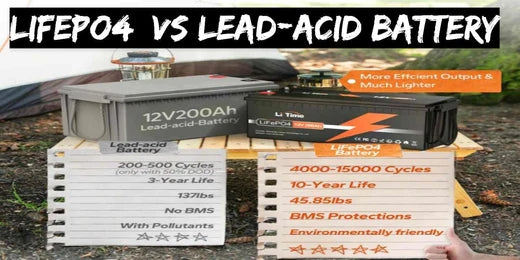In recent years, lithium iron phosphate (LiFePO4) batteries have become increasingly popular in the market as a more efficient and environmentally-friendly alternative to traditional lead acid batteries. While lead acid batteries have been the primary power source for many years, the emergence of LiFePO4 technology has given consumers the opportunity to make a more informed decision about which battery best suits their needs.
In this article, we will delve into the differences between LiFePO4 batteries and lead acid batteries and why you should consider switching to LiFePO4.

Part 1:All You Need to Know About Lead Acid Batteries
1.1 What is Lead Acid Battery?
Lead-acid batteries are a type of rechargeable battery commonly used in automobiles and other applications, such as backup power, emergency lighting, and solar power systems. They were invented by Gaston Planté in 1859 and continue to be widely used today due to their low cost, high reliability, and relatively high energy density.
The basic design of a lead-acid battery involves immersing lead plates (positive and negative electrodes) into an electrolyte solution of sulfuric acid and water. The positive plate is coated with lead dioxide, while the negative plate is made of pure lead. These plates are separated by porous insulators, and the entire assembly is enclosed within a plastic or rubber casing.
1.2 Characteristics of Lead-Acid Batteries
Lead-acid batteries are known for their high energy density, allowing them to store a significant amount of energy relative to their size and weight. One of their main advantages is their low manufacturing cost, making them a widely used and attractive option for various applications.However, a drawback is their bulkiness compared to other battery types, making transportation and storage more challenging.Another limitation is their finite cycle life, as they can only undergo a limited number of charge-discharge cycles before experiencing degradation, which may restrict their use in certain applications. Moreover, it's essential to handle lead-acid batteries with care due to the presence of toxic chemicals such as sulfuric acid and lead, which can be harmful to the environment if not properly managed.
Part 2: Advantages of Choosing LiFePO4 Batteries
2.1 What is LiFePO4?
Lithium iron phosphate (LiFePO4) batteries are a superior and newer type of rechargeable battery, outperforming lead acid batteries in multiple aspects. With a higher energy density, they can store more energy in a compact form, making them perfect for various portable devices like laptops, smartphones, and electric vehicles.
2.2 Characteristics of Lithium Iron Phosphate (LiFePO4) Battery
Lithium Iron Phosphate (LiFePO4) batteries are a type of rechargeable battery that offers several advantages over other lithium-ion batteries. Here are some of the features of LiFePO4 batteries:
1. Higher Energy Density: LiFePO4 batteries have a high energy density, allowing them to store a large amount of energy in a relatively small size and weight.
2. Long Cycle Life: LiFePO4 batteries have a long cycle life, meaning they can be charged and discharged multiple times without significant capacity loss.
3. Safe Chemistry: LiFePO4 batteries have a safer chemistry compared to other
4. Wide Temperature Range: LiFePO4 batteries can operate over a wide temperature range, making them suitable for use in extreme temperature conditions.
LFP-100: LiTime 12V 100Ah LiFePO4 Lithium Battery
LFP-200: LiTime 12V 50Ah LiFePO4 Lithium Battery
5. Fast Charging: LiFePO4 batteries can charge at a higher rate than other
6. Low Self-Discharge Rate: LiFePO4 batteries have a low self-discharge rate, which means they can maintain their charge for a longer period when not in use.
 Data source: Litime laboratory
Data source: Litime laboratory
Part 3: The Comparison Between LiFePO4 Battery and Lead Acid Battery
| Battery Type | Lithium Iron Phosphate( LiFePO4) |
Lead Acid |
|
Energy Discharge Rate |
80%-90% |
30%-40% |
|
Lifespan |
>2000 (up to 10 years or more) |
>400 (typically last between 3-5 years) |
|
Energy Density |
High |
Media |
|
Safety |
Low(presence of toxic materials) |
Excellent((no risk of fire / explosion) |
|
Charging |
Can be charged much faster compared to lead-acid batteries. LiFePO4 batteries can be charged at a high rate without damage to the battery. |
Require a slower charging rate to avoid damage. |
Lithium iron phosphate (LiFePO4) batteries offer significant advantages compared to lead-acid batteries. Firstly, they boast a substantially longer lifespan, with proper maintenance enabling them to last up to 10 years, whereas lead-acid batteries typically only endure 3-5 years. This extended longevity not only reduces replacement expenses but also makes LiFePO4 batteries a highly cost-effective option.
Beyond their extended lifespan, LiFePO4 batteries stand out for their eco-friendliness. Unlike lead-acid batteries, which contain hazardous substances like lead and sulfuric acid, LiFePO4 batteries are constructed with non-toxic materials that can be recycled, thereby minimizing their environmental impact.
In terms of performance, LiFePO4 batteries excel over lead-acid batteries. They deliver more power in shorter periods, making them ideal for high-drain applications like electric vehicles. Additionally, their superior energy storage and release efficiency translate to longer run times for devices such as laptops and smartphones.
Overall, the combination of extended lifespan, environmental friendliness, and enhanced performance makes lithium iron phosphate batteries a compelling choice for various applications, especially where reliability and sustainability are paramount considerations. However, it's essential to consider specific requirements and use cases when selecting the most suitable battery type.
With its superior performance and cost-effectiveness in the long term, the LiFePO4 battery clearly emerges as the preferred choice over lead-acid batteries.
Conclusion
Although lead-acid batteries have served as a conventional power source for a considerable time, the numerous advantages of lithium iron phosphate batteries position them as the superior choice for a wide range of applications. With enhanced efficiency, extended lifespan, and greater environmental friendliness, lithium iron phosphate batteries offer a compelling solution. For those seeking a dependable, cost-effective, and eco-friendly battery option, transitioning to lithium iron phosphate batteries is highly recommended.









